Rachel Dodge's Blog, page 8
January 11, 2022
Before Emily Post: Regency Conduct Books for Young Ladies

Ever wonder how Jane Austen and her heroines always know just what to do (and what not to do) in every social situation? The short answer: Conduct books!
During Jane Austen’s lifetime, conduct books contained detailed information regarding ideal conduct and character for young people. They came in the form of letters, pamphlets, and full-length novels and covered an array of topics meant to instruct, mold, and inform young minds and hearts.
Conduct manuals played a large part in forming Austen’s culture and the world of her novels. To better understand her world and her characters, let’s take a closer look at Regency Era conduct literature for young ladies.
 Conduct Books
Conduct BooksWhereas etiquette books of the last century, such as Emily Post’s Etiquette, stressed good manners and how to behave in specific social situations, the conduct manuals and letters written for young ladies in Jane Austen’s time focused mainly on propriety. The central purpose was to mold the character of a young woman and teach her how to think, act, and speak in a way that was both morally and socially proper.
Conduct manuals discussed a wide range of subjects, including household chores, religion, and what to look for in a husband. However, the underlying concern evident in most of the conduct pamphlets being written at this time was the cultivation of “virtue” in the female sex. As Mary Wollstonecraft Godwin states in Thoughts on the Education of Daughters (1787), “the main business of our lives is to learn to be virtuous.” And according to many eighteenth-century conduct books, a woman’s virtue was expressed in her attitudes, her carriage, her accomplishments, and her actions and speech.
But what did these books, letters, and pamphlets actually say? Let’s take a closer look at three examples from the late 1700s to see what young ladies were taught during Austen’s youth and adolescence:
“A Father’s Legacy to His Daughters”In John Gregory’s popular conduct book, A Father’s Legacy to his Daughters (first published in 1774), Gregory told his daughters that they should aspire to the kind of “virtue” their deceased mother possessed and put on “a certain gentleness of spirit and manners extremely engaging in [women].”

Carl H. Pforzheimer Collection of Shelley and His Circle, The New York Public Library. “A father’s legacy to his daughters.” The New York Public Library Digital Collections.
The topics for this particular conduct book are as follows:
ReligionConduct and BehaviourAmusementsFriendship, Love, MarriageOn the topic of Amusements, Gregory has this to say:
“Some amusements are conducive to health, as various kinds of exercise: some are connected with qualities really useful, as different kinds of women’s work, and all the domestic concerns of a family: some are elegant accomplishments, as dress, dancing, music, and drawing. Such books as improve your understandings, enlarge your knowledge, and cultivate your taste, may be considered in a higher point of view than mere amusements. There are a variety of others, which are neither useful nor ornamental, such as play of different kinds.“ -John Gregory, A Father’s Legacy to his Daughters
On the topic of Friendship, Gregory makes these comments:
“A happy choice of friends will be of the utmost consequence to you, as they may assist you by their advice and good offices. But the immediate gratification which friendship affords to a warm, open, and ingenuous heart, is of itself sufficient motive to court it. In the choice of your friends, have your principal regard to goodness of heart and fidelity. If they also possess taste and genius, that will still make them more agreeable and useful companions.” -John Gregory, A Father’s Legacy to his Daughters
“An Unfortunate Mother’s Advice to Her Absent Daughters”In Lady Pennington’s An Unfortunate Mother’s Advice to Her Absent Daughters (1761), she covers many topics for young ladies, complete with an index of books her daughters should read as part of her discussion on how her daughters should make “mental improvements” through reading, which gives us insight into other literature of the time period that was considered edifying for young ladies:

Along with Gregory, Pennington suggests that virtue should be a person’s highest goal: “Aim at perfection, or you will never reach to an attainable height of virtue.”
She goes into great detail on an expansive number of subjects, but one interesting highlight that seems to have been common for Jane Austen herself and for her leading ladies is in regard to one’s daily schedule. She explains that mornings should be spent in domestic duties and “improvement.” Afternoons “may then be allowed to diversions” (which includes “company, books of the amusing kind, and entertaining productions of the needle, as well as plays, balls”).
But, she says, the former part of the day should be “devoted to more useful employments”:
“One half hour, or more, either before or immediately after breakfast, I would have you constantly give to the attentive perusal of some rationally pious author, or to some part of the New Testament, with which, and indeed with the whole Scripture, you ought to make yourself perfectly acquainted, as the basis on which your religion is founded. From this practice you will reap more real benefit than can be supposed by those who have never made the experiment.” –Lady Pennington, An Unfortunate Mother’s Advice to Her Absent Daughters
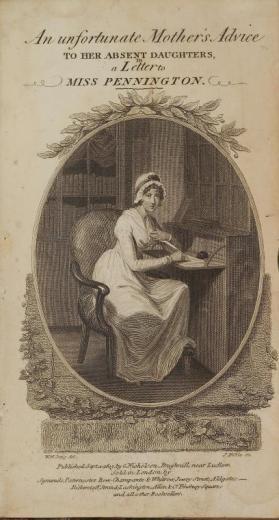 Carl H. Pforzheimer Collection of Shelley and His Circle, The New York Public Library. “An Unfortunate Mother’s Advice to Her Absent Daughters, in a letter to Miss Pennington,” The New York Public Library Digital Collections.
Carl H. Pforzheimer Collection of Shelley and His Circle, The New York Public Library. “An Unfortunate Mother’s Advice to Her Absent Daughters, in a letter to Miss Pennington,” The New York Public Library Digital Collections.Further advice includes studying “your own language thoroughly, that you may speak correctly, and write grammatically.” She suggests being “well acquainted” with French and, if possible, Italian; the history of England other European nations; Geography, as this will “make history more entertaining to you;” Philosophy; and the “first four rules of Arithmetic.” Music and Drawing are humorously described as “accomplishments well worth the trouble of attaining, if your inclination and genius lead to either: if not, do not attempt them; for it will be only much time and labour unprofitably thrown away.”
Finally, a quote I found personally inspiring which I can imagine Austen might have agreed with:
“An Enquiry into the Duties of the Female Sex“Expect not many friends, but think yourself happy, if, through life, you meet with one or two who deserve that name, and have all the requisites for the valuable relation.
Lady Pennington, An Unfortunate Mother’s Advice to Her Absent Daughters
Austen herself read a conduct manual titled An Enquiry into the Duties of the Female Sex, written by Thomas Gisborne (1797), which followed his popular “Enquiries into the Duties of Men.” It covers topics such as the differences between men and women, female education, introducing young women into society, conversation and letter writing, dress, entertainment, the employment of time, choosing a husband, the duties of parents, and so forth.
I am glad you recommended “Gisborne”, for having begun, I am pleased with it, and I had quite determined not to read it.
Letter from Jane to Cassandra, 30 August 1805
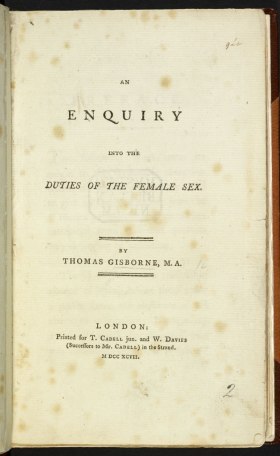
To explain Austen’s possible reason for this common, the British Library has this to say:
“We don’t know why Austen had ‘determined not to read’ An Enquiry. Perhaps she expected it to be similar to the Mr Collins-endorsed Sermons to Young Women, referred to in Pride and Prejudice, which stresses the need for women to be submissive and modest. In fact, Gisborne praises woman’s capacity for ‘sprightliness and vivacity’, ‘quickness of perception’ and ‘fertility of invention’ – as well as the more traditional female virtues of offering comfort and cheer to those around them.
“Though Gisborne’s views seem conservative to modern readers, many of them are similar to those that Austen expresses in her novels. He urges women to spend time each day reading improving books, mentioning as particularly suitable the works of William Cowper, one of Austen’s favourite poets (p. 219). He warns against the ‘absurd and mischievous’ belief that a woman can reform a cruel and immoral man after marrying him (p. 238), and criticises mothers who prioritise wealth over happiness in choosing husbands for their daughters.” (British Library, Conduct Book for Women)
Forms of Conduct LiteratureThere were countless other conduct books, letters, and pamphlets written during Austen’s lifetime. These, along with sermons and religious writings, were the only kind of reading material that was thought proper for young ladies. Later, didactic novels that taught a moral lesson in story form, became more popular. Still within the genre of conduct literature, didactic novels were written to entertain and instruct. Stay tuned for more on that topic next month.
I encourage you to follow the links above and read some of these books for yourself. It’s quite interesting to find out what exactly young women were taught during Jane Austen’s time. And it’s easy to see where Austen may have found instruction, inspiration, and even, at times, amusement within their pages.
Which Jane Austen heroine read conduct books (or was given one to read)? And which characters do you think would have tossed them aside in favor of a novel??
The post Before Emily Post: Regency Conduct Books for Young Ladies appeared first on Rachel Dodge.
January 3, 2022
Jane Austen Season – Online at Cambridge!

Would you like to study Jane Austen’s novels at Cambridge? Well, here’s your chance – and it’s all online!
Jane Austen Season at Cambridge Description: “Join us for a season of lectures devoted to the novels of Jane Austen. Each session focuses on a single novel, with a live online lecture and seminar with a leading Cambridge scholar. Sessions take place once a month, on a Sunday at 6.00 pm British Time, January to April 2022.” You can join each session separately or sign up for all of them!
Dates:Sunday 9 January 2022: Emma
Sunday 13 February 2022: Sense and Sensibility
Sunday 20 March 2022: Persuasion
Sunday 24 April 2022: Pride and Prejudice
From LiteratureCambridge.co.uk
Match-making in EmmaCourse Description: Guessing who is or might be in love with whom is a favourite activity in Highbury, and Emma, the great ‘imaginist’ in that community, is its supreme practitioner. This fondness for making up stories that end in marriage is something that she shares with Austen: Austen’s readers are themselves drawn into match-making.
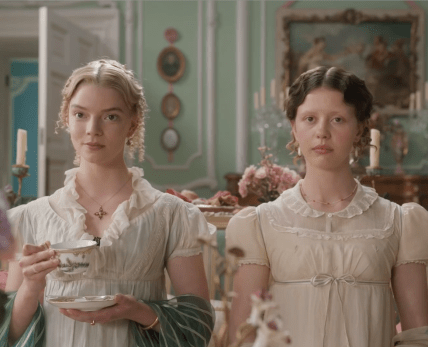
We shall explore the difficulty in reading the signs of love in social exchanges, why story-telling might be crucial to this, and what it suggests about the psychology of feeling if the reader or the story-teller can be well ahead of the person who turns out to have always been in love.
Live online lecture and seminar with Fred Parker, Senior Lecturer in English and Fellow of Clare College, University of Cambridge. Date: Sunday 9 January 2022, 6.00 pm.
Money in Sense and SensibilityCourse Description: While Elinor’s sense and Marianne’s sensibility shape the trajectory of Austen’s first published novel, other factors are at play: the Dashwood sisters’ fates are determined by the oblique movements of money.
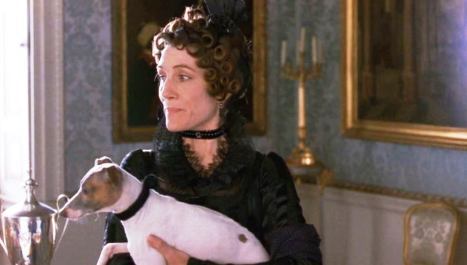
This lecture will explore how Austen satirises money in Sense and Sensibility. We will consider the context of Georgian law, how language describing money permeates the text, and finally, Austen’s persuasive destabilisation of her characters’ — and her readers’ — expectations.
Live online lecture and seminar with Claire Wilkinson, University of Cambridge. Date: Sunday 13 February 2022, 6.00 pm.
The Art of Influencing in PersuasionCourse Description: This lecture will explore how acts of persuasion become the main driving force of the narrative in Persuasion.
In his Dictionary of the English Language (1755), Samuel Johnson defined persuasion as ‘the act of influencing by expostulation; the act of gaining or attempting the passions’. Such instances of influencing and rhetoric operate on multiple levels in the novel. They affect the power dynamic between characters but also determine their inner worlds in the form of intricate acts of self-persuasion.
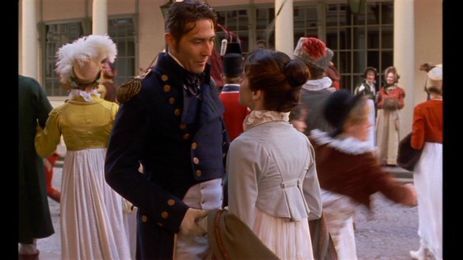
These acts manifest themselves through the novel’s narrative technique of free indirect discourse, revealing the complex psychologies of thought and feeling that operate behind the façade of Jane Austen’s world of polite manners.
Live online lecture and seminar with Ildiko Csengei, author of Sympathy, Sensibility and the Literature of Feeling in the Eighteenth Century. Date: Sunday 20 March 2022, 6.00 pm.
Home in Pride and Prejudice (1813)Course Description: When is a house a home? Dwellings abound in Pride and Prejudice, but how many of them are Homes in today’s usual – often rather cosy and sentimental – sense? Is Lady Catherine de Burgh’s pretentious, rather arriviste Rosings a home, and what of the altogether more established grandeur of Mr. Darcy’s Pemberly?
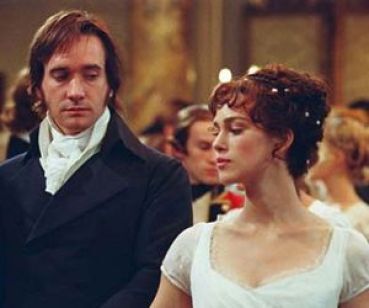
This lecture considers Pride and Prejudice in the light of one of the biggest cultural shifts of the nineteenth century – the invention of ‘Home’, and some of its consequences.
Live online lecture and seminar with Alison Hennegan, Retired Fellow of Clare Hall, University of Cambridge. Date: Sunday 24 April 2022, 6.00 pm.
Book Your Classes Here: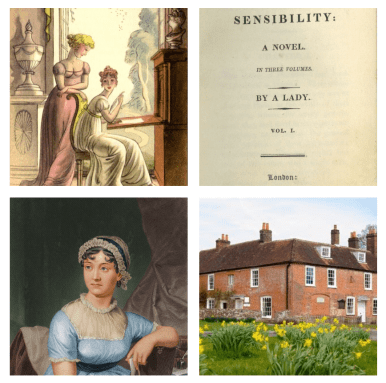 Book Here
Book HereWhich of these classes interests you most? They all sounds good to me, but I think Money in Sense and Sensibility would be particularly fascinating!
Grace and peace,
Rachel
Subscribe to my blog
for articles on literature, faith, and my writing adventures!
Order signed books here on my web site!
Each autographed book comes with a matching bookmark.
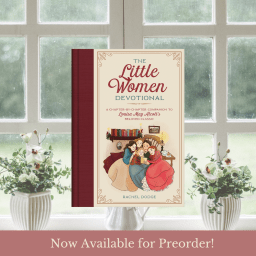 COMING DEC 1ST: PRE-ORDER HERE!
COMING DEC 1ST: PRE-ORDER HERE! The Anne Devotional
The Anne Devotional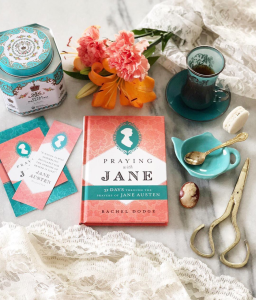 Praying with Jane
Praying with JaneThe post Jane Austen Season – Online at Cambridge! appeared first on Rachel Dodge.
December 14, 2021
Party Like the Musgroves
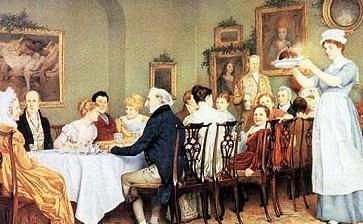
I love the idea of a Regency-style Christmas season, complete with gifts, foods, and traditions that Jane Austen and her heroines might have enjoyed. Though Christmas traditions were different during Jane Austen’s time than they are today, as I share in my article about Regency Christmas Traditions, it’s fun to think of creative ideas that can make for a truly Austen-tatious holiday season.
In Persuasion, Austen paints a lovely Christmas scene. It’s one of my favorite festive literary Christmas descriptions, and I love to think of ways to recreate it:
On one side was a table occupied by some chattering girls, cutting up silk and gold paper; and on the other were tressels and trays, bending under the weight of brawn and cold pies, where riotous boys were holding high revel; the whole completed by a roaring Christmas fire, which seemed determined to be heard, in spite of all the noise of the others. […] Charles and Mary also came in, of course, during their visit, and Mr Musgrove made a point of paying his respects to Lady Russell, and sat down close to her for ten minutes, talking with a very raised voice, but from the clamour of the children on his knees, generally in vain. It was a fine family-piece.
Persuasion, Jane Austen
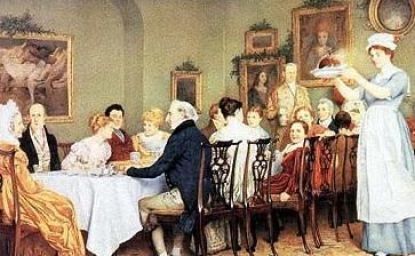 Evergreen Decor:
Evergreen Decor:“On Christmas Eve the children laid out the traditional holly branches on the window ledges…”
–Jane Austen: A Life, Claire Tomalin
Create your own holiday decorations the way people did during Jane Austen’s time. Trim your windows and home with holly branches and evergreen trimmings. For Regency-inspired holiday decorating ideas, check out this Jane Austen’s World article on Regency Era Christmas Evergreen Decorations.
Craft Table with Silver & Gold Paper:“On one side was a table occupied by some chattering girls, cutting up silk and gold paper…” –Persuasion, Jane Austen
Create a craft station for children and adults to make ornaments or other crafts like these: from Abbi Kirsten.
Tressels and Trays:“…on the other were tressels and trays, bending under the weight of brawn and cold pies…” –Persuasion, Jane Austen
Load your table with Christmas Pye and other Regency Foods (Jane Austen’s World)Make a Traditional White Soup (InLiterature.com)Make a Christmas Pudding (Jane Austen’s World)Provide a Wassail Bowl of Mulled Cider (Jane Ausen’s World)Go BIG and plan an entire Regency-style Menu: A Regency Christmas Menu (Thither.com) A pot of simmering wassail, infused with citrus fruit slices and cinnamon sticks. (Wikipedia Commons)Riotous Games:
A pot of simmering wassail, infused with citrus fruit slices and cinnamon sticks. (Wikipedia Commons)Riotous Games:“…riotous boys were holding high revel…” –Persuasion, Jane Austen
Play Blind Man’s Bluff or Hunt the Slipper: Two Songs/Dances/Games Played During a Regency Christmas Season (Jane Austen’s World)Play this Pride and Prejudice Parlor GameRead this fun article by Lucy Worsley on Parlor Games of the Past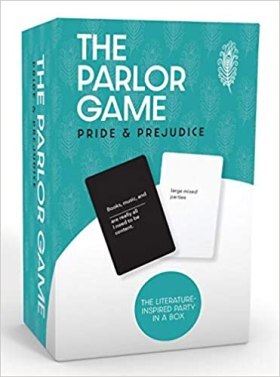 A Roaring Fire:
A Roaring Fire:“…the whole completed by a roaring Christmas fire, which seemed determined to be heard, in spite of all the noise of the others.” –Persuasion, Jane Austen
Build a cozy fire or even Light the Yule Log (Jane Austen’s World)Bake and decorate a Yule Log Dessert (Tyra Rachele – All Recipes) A Yule Log CakeJane-Inspired Gifts to Buy
A Yule Log CakeJane-Inspired Gifts to BuyThis holiday season, add a little “Jane” to your gift giving! Here are a few shops and lists to peruse:
Alwayz A Treasure Homemade Jane Austen JewelryLiterary Gift Company Jane Austen CollectionGifts from the Jane Austen CentreThe Complete Austen Gift-Buying Guide from Dear English MajorAustenesque Homemade GiftsWant to make your own gifts? Check out these creative ideas!
Make Regency-style Scented Sachets (or “sweet bags”) (Jane Austen Centre) Bake and decorate Jane Austen Silhouette Cookies (Regency Austentation) Scented Sachets, Jane Austen CentreCharitable Giving
Scented Sachets, Jane Austen CentreCharitable GivingFinally, charitable gift giving was a large part of the Regency Christmas season. On the day after Christmas, on St. Stephen’s Day (now called Boxing Day), people gave gifts to charities and to those in need. The gentry gave gifts to the servants who worked in their homes and those hired to help on their land. Read The History of Boxing Day And How To Celebrate It (Lindsay Schlegel – Verity.com) for some modern-day ideas for ways to celebrate Boxing Day.
Now it’s your turn! What do you like to do around the holidays to make your gifts and get-togethers special? Do you have any Jane Austen traditions this time of year? I enjoy attending one of the local Jane Austen Birthday Teas in my area at this time of year. At home, I love to decorate the house with greenery and bake family recipes! -Rachel
RACHEL DODGE teaches college English classes, gives talks at libraries, teas, and book clubs, and writes for Jane Austen’s World blog and Jane Austen’s Regency World magazine. She is the bestselling author of The Anne of Green Gables Devotional: A Chapter-By-Chapter Companion for Kindred Spirits and Praying with Jane: 31 Days Through the Prayers of Jane Austen. Her newest book The Little Women Devotional is now available just in time for Christmas! You can visit Rachel online at www.RachelDodge.com.
The post Party Like the Musgroves appeared first on Rachel Dodge.
November 29, 2021
Merry Christmas, Anne!
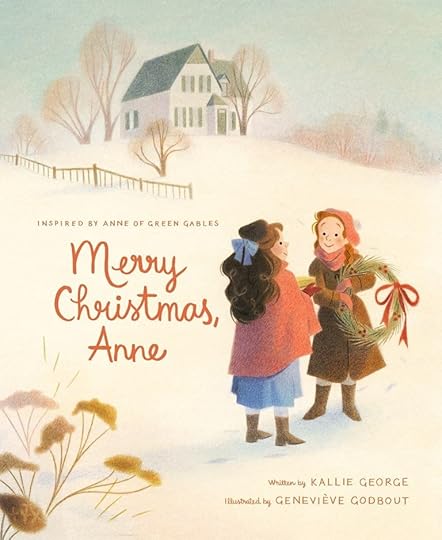
I have another Anne of Green Gables-inspired book by Kallie George to share with you just in time for Christmas. This time, it’s a sweet picture book all about Christmas with Anne Shirley. If there’s a kindred spirit or bosom friend on your shopping list this year, this book will make her Christmas warm and bright! I can’t wait to get my hands on it and take a look inside. For now, here are some highlights from the book:
Book DescriptionA heartwarming holiday picture book inspired by L.M. Montgomery’s beloved classic Anne of Green Gables.
It’s Christmas in Avonlea, and Anne is thankful for so many things: feathery frosts and silvery seas, and wreaths as round as the moon. But most of all, she’s thankful for her kindred spirits, including Marilla and Matthew Cuthbert, who adopted her, and her bosom friend Diana. But Anne is distracted this holiday by having to recite at the upcoming Christmas concert. And she feels bad that her kindred spirits give her so much during the year when she has very little to give in return. Can Anne overcome her jitters and make her kindred spirits proud — and also think of a way to show her appreciation for the people she loves?
With magical illustrations and a heartfelt message, this festive picture book is the perfect holiday read for Anne fans old and new and a joyous way to celebrate the season.

 About the Author
About the AuthorKALLIE GEORGE is an author, editor and creative writing teacher. She has written numerous books for early readers, including Anne Arrives (Book 1), Anne’s Kindred Spirits (Book 2), The Magical Animal Adoption Agency series, The Heartwood Hotel series and The Wings of Olympus series, as well as numerous picture books, such as Goodnight, Anne, If I Couldn’t Be Anne, Secrets I Know and The Lost Gift.

Kallie received her Masters of Children’s Literature from the University of British Columbia. She loves picture books, fairy tales, beautiful art and music, and baking cookies. Kallie currently lives in Vancouver, BC, and feels positively certain she and Anne Shirley are kindred spirits. You can follow her online here.
Let’s keep in touch:Subscribe to my blog
for articles on literature, faith, and my writing adventures!
Order signed books here on my web site!
Each autographed book comes with a matching bookmark.
 The Little Women Devotional
The Little Women Devotional The Anne Devotional
The Anne Devotional Praying with Jane
Praying with JaneThe post Merry Christmas, Anne! appeared first on Rachel Dodge.
November 22, 2021
More Jesus, More Joy.

When my kids were tiny, I coined the term “two-minute shower” because I learned to literally soap up and rinse off in two minutes flat most mornings. Why? Because that’s as far as I could get before my toddler popped her head in to ask a question or my baby boy started crying.
As women, we learn to do things as quickly and efficiently as possible, usually putting the needs of others before my own. Most of us eat last, drink last, sit last, and go to bed last. Our breakfasts remain untouched on the counter; our hot drinks sit in the microwave, reheated five times but never finished. Our to-do lists never end.
Somehow we learn to absorb everyone else’s needs, schedules, and activities—always scooching over to make room for one more thing. We make sacrifices. We make it work. We make do.
Making Do Never WorksBut unfortunately, that often spills into our spiritual lives. We learn to make do with less and less of Jesus. Somehow, our most important, most life-giving relationship gets pushed aside. We get tricked into thinking it’s something we can do without. And before long, our joy meter starts running low.
Less of Jesus equals less joy. And at Christmas, the season that’s supposed to be all about Jesus—and all about joy and peace—we often spend even less time with Jesus and more time feeling rushed and frazzled.
But what if Christmas was different this year? What if our time with Jesus was the centerpiece of each day? What if we moved our personal devotions to the top of our to-do lists?
Open the Door of Your HeartIn Revelation 3:20, Jesus said, “Behold, I stand at the door, and knock: if any man hears my voice, and open the door, I will come in to him, and will sup with him, and he with me.” Jesus is waiting to be asked in; all we have to do is open the door. When we do—when we open up our hearts and our schedules to Jesus—He promises to come in and dine with us!
The picture of having dinner with Jesus sounds amazing, doesn’t it? I want to eat and drink deeply of all He has for me. I want a feast for the soul. I don’t want a quick bite; I want the full-course meal. And I know you do, too.
This December, make a plan to feast with Jesus every day.
Fill Your CupThe best way you can fill your cup is by making a daily date with Jesus. Here are a few practical tips and ideas for you to make it special and make it a priority:
Pick a time and a cozy corner where you can meet with Him. Set a reminder if needed!Set out your Bible, a notebook and pen, and a warm blanket beforehand.Pick out a candle or switch on the Christmas lights.Make a cup of something warm to sip.Open your Bible, bow your head, and open the doors of your heart by starting with prayer. Invite Jesus in and ask Him to revive your heart and restore your soul.Let’s make snuggling up with Jesus into a really big deal this Christmas. And let’s get filled up until we’re brimming over with JOY.
If you’re looking for a devotional book to try this season, please visit my online gift shop! I have devotional books based on Jane Austen’s prayers, Anne of Green Gables, and Little Women. Each devotional book makes a lovely gift for a friend or loved one, too.
Wishing you Joy this season!
Grace and peace,
Rachel
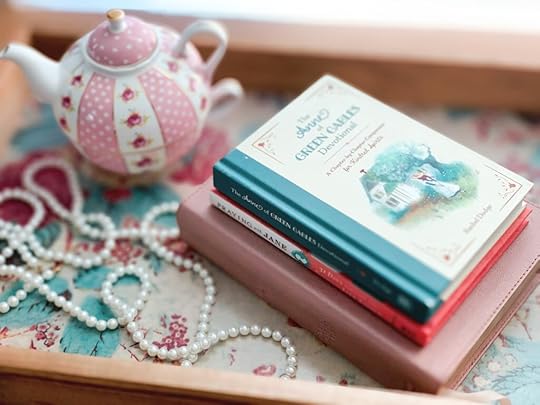 Order Devotional Books and Gifts Here!Let’s keep in touch:
Order Devotional Books and Gifts Here!Let’s keep in touch:Subscribe to my blog
for soul-nourishing articles on literature, faith, and writing!
The post More Jesus, More Joy. appeared first on Rachel Dodge.
Making time with Jesus

When my kids were tiny, I coined the term “two-minute shower” because I learned to literally soap up and rinse off in two minutes flat most mornings. Why? Because that’s as far as I could get before my toddler popped her head in to ask a question or my baby boy started crying.
When I became a mom I learned to do everything quickly and efficiently and put the needs of others before my own. We eat last, drink last, sit last, and go to bed last. Our breakfasts remain untouched on the counter; our hot drinks sit in the microwave, reheated five times but never finished.
Somehow we learn to absorb everyone else’s needs, schedules, and activities—always scooching over to make room for one more thing. We make sacrifices. We make it work. We make do.
Making Do Never WorksBut unfortunately, that often spills into our spiritual lives. We learn to make do with less and less of Jesus. Somehow, our most important, most life-giving relationship gets pushed aside. We get tricked into thinking it’s something we can do without. And before long, our joy meter starts running low.
Less of Jesus equals less joy. And at Christmas, the season that’s supposed to be all about Jesus—and all about joy and peace—we often spend even less time with Jesus and more time feeling rushed and frazzled.
But what if Christmas was different this year? What if our time with Jesus was the centerpiece of each day? What if we moved our personal devotions to the top of our to-do lists?
Open the DoorIn Revelation 3:20, Jesus said, “Behold, I stand at the door, and knock: if any man hears my voice, and open the door, I will come in to him, and will sup with him, and he with me.” Jesus is waiting to be asked in; all we have to do is open the door. When we do—when we open up our hearts and our schedules to Jesus—He promises to come in and dine with us!
The picture of having dinner with Jesus sounds amazing, doesn’t it? I want to eat and drink deeply of all He has for me. I want a feast for the soul. I don’t want a quick bite; I want the full-course meal. And I know you do, too.
This December, let’s make a plan to feast with Jesus every day. Pick a time and a cozy corner where you can meet with Him. Set out your Bible, a notebook and pen, a hot drink, a warm blanket, and maybe even some fuzzy slippers. If you’re an early riser or a night owl, light a candle or switch on the Christmas lights. Open your Bible, bow your head, and open the doors of your heart. Invite Jesus in and ask Him to revive your heart and restore your soul.
Let’s make snuggling up with Jesus into a really big deal this Christmas. And let’s get filled up until we’re brimming over with JOY.
If you’re looking for a devotional book to try this season, please visit my online gift shop! I have devotional books based on Jane Austen’s prayers, Anne of Green Gables, and Little Women. Each devotional book makes a lovely gift for a friend or loved one, too.
Wishing you Joy this season!
Grace and peace,
Rachel
 Order Devotional Books and Gifts Here!Let’s keep in touch:
Order Devotional Books and Gifts Here!Let’s keep in touch:Subscribe to my blog
for soul-nourishing articles on literature, faith, and writing!
The post Making time with Jesus appeared first on Rachel Dodge.
November 15, 2021
Jane Austen Season at Cambridge

Would you like to study Jane Austen’s novels at Cambridge? Well, here’s your chance – and it’s all online!
Jane Austen Season at Cambridge Description: “Join us for a season of lectures devoted to the novels of Jane Austen. Each session focuses on a single novel, with a live online lecture and seminar with a leading Cambridge scholar. Sessions take place once a month, on a Sunday at 6.00 pm British Time, January to April 2022.”
Dates:Sunday 9 January 2022: Emma
Sunday 13 February 2022: Sense and Sensibility
Sunday 20 March 2022: Persuasion
Sunday 24 April 2022: Pride and Prejudice
From LiteratureCambridge.co.uk
Match-making in EmmaCourse Description: Guessing who is or might be in love with whom is a favourite activity in Highbury, and Emma, the great ‘imaginist’ in that community, is its supreme practitioner. This fondness for making up stories that end in marriage is something that she shares with Austen: Austen’s readers are themselves drawn into match-making.

We shall explore the difficulty in reading the signs of love in social exchanges, why story-telling might be crucial to this, and what it suggests about the psychology of feeling if the reader or the story-teller can be well ahead of the person who turns out to have always been in love.
Live online lecture and seminar with Fred Parker, Senior Lecturer in English and Fellow of Clare College, University of Cambridge. Date: Sunday 9 January 2022, 6.00 pm.
Money in Sense and SensibilityCourse Description: While Elinor’s sense and Marianne’s sensibility shape the trajectory of Austen’s first published novel, other factors are at play: the Dashwood sisters’ fates are determined by the oblique movements of money.

This lecture will explore how Austen satirises money in Sense and Sensibility. We will consider the context of Georgian law, how language describing money permeates the text, and finally, Austen’s persuasive destabilisation of her characters’ — and her readers’ — expectations.
Live online lecture and seminar with Claire Wilkinson, University of Cambridge. Date: Sunday 13 February 2022, 6.00 pm.
The Art of Influencing in PersuasionCourse Description: This lecture will explore how acts of persuasion become the main driving force of the narrative in Persuasion.
In his Dictionary of the English Language (1755), Samuel Johnson defined persuasion as ‘the act of influencing by expostulation; the act of gaining or attempting the passions’. Such instances of influencing and rhetoric operate on multiple levels in the novel. They affect the power dynamic between characters but also determine their inner worlds in the form of intricate acts of self-persuasion.

These acts manifest themselves through the novel’s narrative technique of free indirect discourse, revealing the complex psychologies of thought and feeling that operate behind the façade of Jane Austen’s world of polite manners.
Live online lecture and seminar with Ildiko Csengei, author of Sympathy, Sensibility and the Literature of Feeling in the Eighteenth Century. Date: Sunday 20 March 2022, 6.00 pm.
Home in Pride and Prejudice (1813)Course Description: When is a house a home? Dwellings abound in Pride and Prejudice, but how many of them are Homes in today’s usual – often rather cosy and sentimental – sense? Is Lady Catherine de Burgh’s pretentious, rather arriviste Rosings a home, and what of the altogether more established grandeur of Mr. Darcy’s Pemberly?

This lecture considers Pride and Prejudice in the light of one of the biggest cultural shifts of the nineteenth century – the invention of ‘Home’, and some of its consequences.
Live online lecture and seminar with Alison Hennegan, Retired Fellow of Clare Hall, University of Cambridge. Date: Sunday 24 April 2022, 6.00 pm.
Book Your Classes Here: Book Here
Book HereWhich of these classes interests you most? They all sounds good to me, but I think Money in Sense and Sensibility would be particularly fascinating!
Grace and peace,
Rachel
Subscribe to my blog
for articles on literature, faith, and my writing adventures!
Order signed books here on my web site!
Each autographed book comes with a matching bookmark.
 COMING DEC 1ST: PRE-ORDER HERE!
COMING DEC 1ST: PRE-ORDER HERE! The Anne Devotional
The Anne Devotional Praying with Jane
Praying with JaneThe post Jane Austen Season at Cambridge appeared first on Rachel Dodge.
November 8, 2021
Jane Austen’s Heroines: Why Money Matters!

In Austen’s novels, her heroines always carried money with them. But what happened if a lady didn’t have any money or ran out of funds? What problems (and dangers) could arise, especially if she was away from home?
Last month, I wrote about Pin Money in Jane Austen’s life and novels. This time, I’m looking more closely at the importance of money in a genteel woman’s life and how it plays out in Austen’s novels.
First, money is one obvious way parents could put limits on their children and keep them under control. This happened to both sexes for various reasons in Jane Austen’s time, but it carried even more weight for a woman because there were also financial consequences that came with marriage once she left her father’s home, even if she came from a wealthy family.
Second, at that time in England, husbands had complete control over the finances of their wives. Without an adequate personal budget to spend as she liked, a wife had to go to her husband to ask for money to buy anything and everything she might need. Without a set allowance, wives could find themselves in a very difficult or unhappy position. This is one of many reasons why the marriage settlement (or prenuptial agreement) was so crucial because it was one way fathers could make sure their daughters (and grandchildren) were taken care of financially.
 Gwyneth Paltrow in Emma, 1996.Marriage Settlements
Gwyneth Paltrow in Emma, 1996.Marriage SettlementsA young woman from a wealthy family would obviously qualify for better marriage terms than a young woman with very little. Her father could leverage what his daughter brought to the marriage for a highly favorable marriage settlement, allowing for her to have the pin money she needed, portions for her children, and a widow’s pension in the event that her husband died. Young women who did not bring as much to the marriage would have a smaller personal budget or, in some cases, no personal budget whatsoever.
In Daniel Pool’s What Jane Austen Ate and What Charles Dickens Knew, he writes, “Typically the bride’s family would have their lawyers negotiate with the husband’s lawyers, to get the husband to agree to grant her ‘pin money,’ which was a small personal annual allowance while he lived, a hefty chunk of property or money to support her after he died, and ‘portions’ of money for their children. All this would be written up in the ‘marriage settlement’ by the lawyers before anybody walked down any aisles.”
In JASNA’s Persuasions, you can read all about The Marriage Law of Jane Austen’s World. (For more on marriage settlements and marriage law in the Regency Era, please see the resources at the end of this article.)
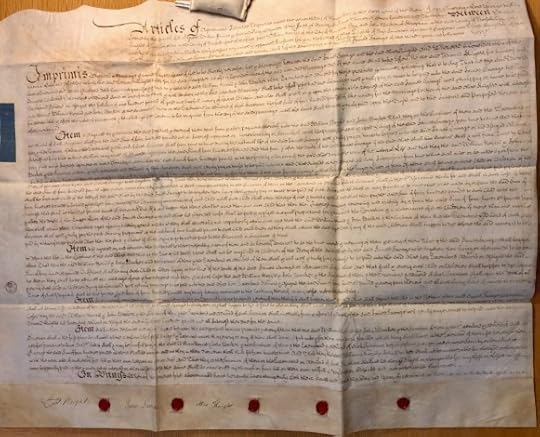 Marriage Settlement, Mills College Library Heller Rare Book Room, Special Collections. Photo by Rachel Dodge, 2019.Money Matters in Jane Austen’s Novels
Marriage Settlement, Mills College Library Heller Rare Book Room, Special Collections. Photo by Rachel Dodge, 2019.Money Matters in Jane Austen’s NovelsIn each of Austen’s novels, we find intriguing scenes that relate to women and personal money. Each of these examples shows us just how important it was for a woman to have her own money and the problems (and dangers) that could arise if she did not have any money or ran out of money, especially if she was away from home:
Fanny Price’s £10In Fanny’s case in Mansfield Park, Sir Thomas supplies her with money before she leaves for her journey to visit her family in Portsmouth:
Harriet Smith’s PurseIt had very early occurred to her that a small sum of money might, perhaps, restore peace for ever on the sore subject of the silver knife, canvassed as it now was continually, and the riches which she was in possession of herself, her uncle having given her £10 at parting, made her as able as she was willing to be generous.
Mansfield Park, Jane Austen
In Emma, we see that Harriet Smith had a small allowance, which helps her when she meets the “trampers” on the road:
More and more frightened, she immediately promised them money, and taking out her purse, gave them a shilling, and begged them not to want more, or to use her ill.
Emma, Jane Austen
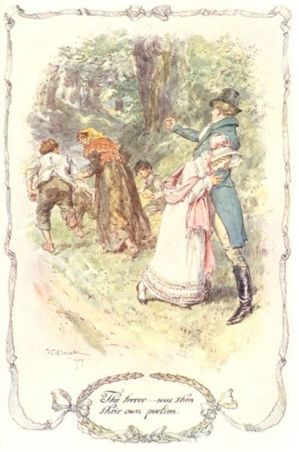 “The terror … was then their own portion.” Illustration by C.E. Brock.Lydia and Kitty Bennet’s Mismanagement
“The terror … was then their own portion.” Illustration by C.E. Brock.Lydia and Kitty Bennet’s MismanagementIn Pride and Prejudice, Lydia and Kitty spend their pin money money at the shops and must borrow money from Elizabeth and Jane when they surprise them for a meal at the inn in Hertfordshire:
Nancy Steele’s Fright“And we mean to treat you all,” added Lydia, “but you must lend us the money, for we have just spent ours at the shop out there.” Then, showing her purchases—“Look here, I have bought this bonnet. I do not think it is very pretty; but I thought I might as well buy it as not. I shall pull it to pieces as soon as I get home, and see if I can make it up any better.”
Lydia Bennet, Pride and Prejudice
In Sense and Sensibility, we find this intriguing passage about the Steele sisters and personal money when Nancy Steele must go to Mrs. Jennings for money after Lucy borrows all of Nancy’s money and marries Robert Ferrars:
Not a soul suspected anything of the matter, not even Nancy, who, poor soul! came crying to me the day after, in a great fright for fear of Mrs. Ferrars, as well as not knowing how to get to Plymouth; for Lucy it seems borrowed all her money before she went off to be married, on purpose we suppose to make a show with, and poor Nancy had not seven shillings in the world…
Mrs. Jennings, Sense and Sensibility
 Lucy Steele (Anna Madeley) and Anne, or “Nancy,” Steele (Daisy Haggardand), Sense and Sensibility, 2008.Catherine Morland’s Borrowed Fare
Lucy Steele (Anna Madeley) and Anne, or “Nancy,” Steele (Daisy Haggardand), Sense and Sensibility, 2008.Catherine Morland’s Borrowed FareIn Northanger Abbey, money becomes quite important in a crucial moment. First, money is mentioned when Catherine Morland goes to London. Her parents send her with money for her personal expenses and ask her to keep account of her spending:
I beg, Catherine, you will always wrap yourself up very warm about the throat, when you come from the rooms at night; and I wish you would try to keep some account of the money you spend; I will give you this little book on purpose.”
Mrs. Morland, Northanger Abbey
Money is mentioned again when Catherine is suddenly and unexpectedly sent home from Northanger Abbey. While she is in London, she is under the care of her hosts, the Allens, who would, of course, pay for many of her expenses while she is under their roof and their protection. However, once she goes to Northanger, she is essentially under the care and protection of General Tilney. When he sends her home abruptly, he does not provide the funds necessary for her journey home, leaving her in a very precarious and even dangerous situation. This was a terrible oversight on his part. Thankfully, Eleanor is able to provide the funds, which we may assume is from her own personal allowance:
It had occurred to her that after so long an absence from home, Catherine might not be provided with money enough for the expenses of her journey, and, upon suggesting it to her with most affectionate offers of accommodation, it proved to be exactly the case.
Catherine had never thought on the subject till that moment, but, upon examining her purse, was convinced that but for this kindness of her friend, she might have been turned from the house without even the means of getting home; and the distress in which she must have been thereby involved filling the minds of both, scarcely another word was said by either during the time of their remaining together.
Northanger Abbey, Jane Austen
Catherine makes it home safely and repays the money to Eleanor by mail with only a short note: “The money therefore which Eleanor had advanced was enclosed with little more than grateful thanks, and the thousand good wishes of a most affectionate heart.”
The Morlands, a very practical bunch, decide after a bit that it all ended well in the end, but even they cannot understand such a “breach of conduct” on General Tilney’s part:
They were far from being an irritable race; far from any quickness in catching, or bitterness in resenting, affronts: but here, when the whole was unfolded, was an insult not to be overlooked, nor, for the first half hour, to be easily pardoned.
Mr. and Mrs. Morland could not but feel … that, in forcing her on such a measure, General Tilney had acted neither honourably nor feelingly—neither as a gentleman nor as a parent. Why he had done it, what could have provoked him to such a breach of hospitality . . . was a matter which they were at least as far from divining as Catherine herself…
Northanger Abbey, Jane Austen
 Felicity Jones as Catherine Morland, Northanger Abbey, 2007.Mrs. Smith’s Recovered Property
Felicity Jones as Catherine Morland, Northanger Abbey, 2007.Mrs. Smith’s Recovered PropertyIn Persuasion, we turn our attention to the widowed Mrs. Smith, whose husband had badly mismanaged their finances: “She was a widow and poor. Her husband had been extravagant; and at his death, about two years before, had left his affairs dreadfully involved.” In this situation, it is not just Mrs. Smith’s personal finances that are at stake, but her finances at large. Here, we see Captain Wentworth use his influence to work on her behalf and help improve her financial circumstances. At the end of the novel, we read this:
[Mrs. Smith] was their earliest visitor in their settled life; and Captain Wentworth, by putting her in the way of recovering her husband’s property in the West Indies, by writing for her, acting for her, and seeing her through all the petty difficulties of the case with the activity and exertion of a fearless man and a determined friend, fully requited the services which she had rendered, or ever meant to render, to his wife.
Persuasion, Jane Austen
When we look at the parents, guardians, husbands, and friends in the examples above, it’s clear that Austen uses money matters (just as she uses so many other clever devices) to point to character and propriety. We could go through each novel and study each of the male and female characters and surmise quite a bit about their personalities just from the way they each manage money.
It’s easy to see that the characters in Austen’s books who provide well for their wives, children, and friends, and those who are generous and charitable with their money, are the characters we should admire and respect. Those who handle their money poorly, and those who manipulate and use and abuse others for financial gain or for personal control, are the characters we should distrust and, in some cases, even despise.
The post Jane Austen’s Heroines: Why Money Matters! appeared first on Rachel Dodge.
November 5, 2021
The Little Women Devotional – Coming Soon!
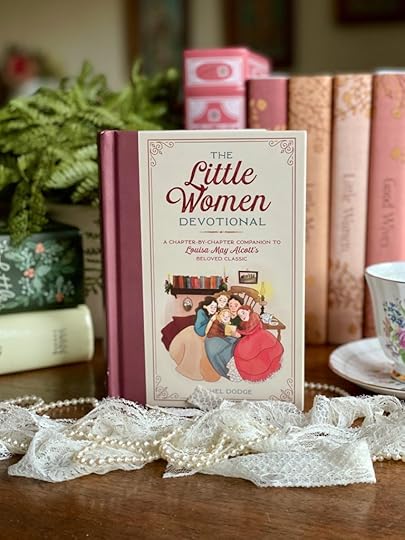
My new book The Little Women Devotional: A Chapter-by-Chapter Companion to Louisa May Alcott’s Beloved Classic releases this holiday season!! You can order copies HERE.
This book has a devotional entry for every chapter of Little Women by Louisa May Alcott. You can read a chapter of Little Women and then read the corresponding devotional entry, going through the book one chapter at a time. It is my prayer that God will use this book to speak to your heart in a personal way as you journey along with the March family.
 Devotional Inspiration from the March Family
Devotional Inspiration from the March FamilyThe Little Women Devotional offers lovely inspiration that explores the themes of faith, family, contentment, wisdom, and joy in the classic Louisa May Alcott novel, cherished by generations of readers.
Each reading corresponds with a chapter from the book and invites you to embrace God’s guiding hand in your life as His cherished daughter. This beautiful 48-day devotional includes original artwork throughout, and each reading includes examples from the novel, scripture, life application, and prayers that are perfect for groups, book clubs, or personal reflection.
Do you love the cover artwork? I sure do! The cover art and illustrations by Miriam Serafin are absolutely lovely. I’ll be sharing sneak peeks of the interior over the next few weeks.
Please share this with all your bookish friends!
Note: For those who want signed copies, I have signed book plates available in my shop. I hope to also have signed books in my shop later next month. Join my Subscribers List for updates.
Grace and peace,
Rachel
“Now, my little pilgrims, suppose you begin again, not in play, but in earnest, and see how far on you can get before Father comes home.” —Marmee March
Pre-Order Here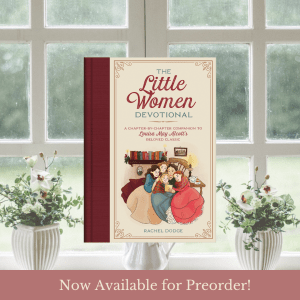 Coming this Holiday Season
Coming this Holiday Season
from Barbour Books


 Delivers Worldwide to over
Delivers Worldwide to over160 countries


Please Note: Due to the worldwide shipping crisis, books are currently delayed. Retailers hope to have the books in stock by late December.
Christmas Orders Placed Before December 10th:
If you preordered The Little Women Devotional elsewhere as a gift for Christmas, click here to order a signed bookmark gift set to put under the tree. If you want to preorder a signed book from my shop directly, I will send you a signed bookmark gift set now and mail your signed book when it comes in.
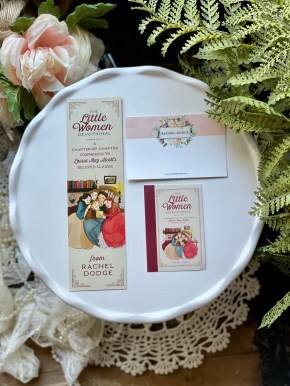
The post The Little Women Devotional – Coming Soon! appeared first on Rachel Dodge.
The Little Women Devotional Countdown!

My new book The Little Women Devotional: A Chapter-by-Chapter Companion to Louisa May Alcott’s Beloved Classic releases in less than a month!! You can order copies HERE. Release date is December 1st, 2021.
This book has a devotional entry for every chapter of Little Women by Louisa May Alcott. You can read a chapter of Little Women and then read the corresponding devotional entry, going through the book one chapter at a time. It is my prayer that God will use this book to speak to your heart in a personal way as you journey along with the March family.
 Devotional Inspiration from the March Family
Devotional Inspiration from the March FamilyThe Little Women Devotional offers lovely inspiration that explores the themes of faith, family, contentment, wisdom, and joy in the classic Louisa May Alcott novel, cherished by generations of readers.
Each reading corresponds with a chapter from the book and invites you to embrace God’s guiding hand in your life as His cherished daughter. This beautiful 48-day devotional includes original artwork throughout, and each reading includes examples from the novel, scripture, life application, and prayers that are perfect for groups, book clubs, or personal reflection.
Do you love the cover artwork? I sure do! The cover art and illustrations by Miriam Serafin are absolutely lovely. I’ll be sharing sneak peeks of the interior over the next few weeks.
Please share this with all your bookish friends!
Note: For those who want signed copies, I have signed book plates available in my shop. I hope to also have signed books in my shop later next month. Join my Subscribers List for updates.
Grace and peace,
Rachel
“Now, my little pilgrims, suppose you begin again, not in play, but in earnest, and see how far on you can get before Father comes home.” —Marmee March
 Coming December 1, 2021
Coming December 1, 2021
from Barbour Books
Order your copy today!


 Delivers Worldwide to over
Delivers Worldwide to over160 countries



The post The Little Women Devotional Countdown! appeared first on Rachel Dodge.



